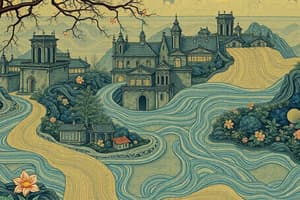Podcast
Questions and Answers
What is the primary function of rivers?
What is the primary function of rivers?
- To bring water from mountains to oceans and lakes (correct)
- To separate mountains from oceans
- To pollute the environment
- To provide a means of transportation
What happens to the snow that falls on mountains?
What happens to the snow that falls on mountains?
- It stays frozen forever
- It evaporates into the air
- It gets blown away by wind
- It melts and becomes a river (correct)
What is the longest river in the world?
What is the longest river in the world?
- The Mississippi River
- The Nile River (correct)
- The Amazon River
- The Yangtze River
What can be a positive effect of a river flooding?
What can be a positive effect of a river flooding?
How can you help keep a river clean?
How can you help keep a river clean?
Flashcards are hidden until you start studying
Study Notes
Importance of Rivers
- Rivers transport water from mountains to oceans and lakes.
- They play a critical role in the water cycle and ecosystem support.
Formation of Rivers
- Rivers originate from melting snow on mountains, where the water flows downhill.
- Water collects to form streams and eventually larger rivers.
Longest River
- The Nile is recognized as the longest river globally, located in Africa.
- It offers recreational activities such as boating.
Impact of Flooding
- Flooding from rivers can benefit agriculture by enriching farmland with nutrients.
- However, flooding can also pose a significant risk to homes and infrastructure.
Pollution Concerns
- Pollution in rivers adversely affects water quality, plant life, and animal habitats.
- Human activity, such as littering, contributes to river pollution.
Local Responsibility
- Local communities are encouraged to engage in river clean-up initiatives.
- Individuals can foster appreciation for rivers by acknowledging their contributions to water supply.
Studying That Suits You
Use AI to generate personalized quizzes and flashcards to suit your learning preferences.




